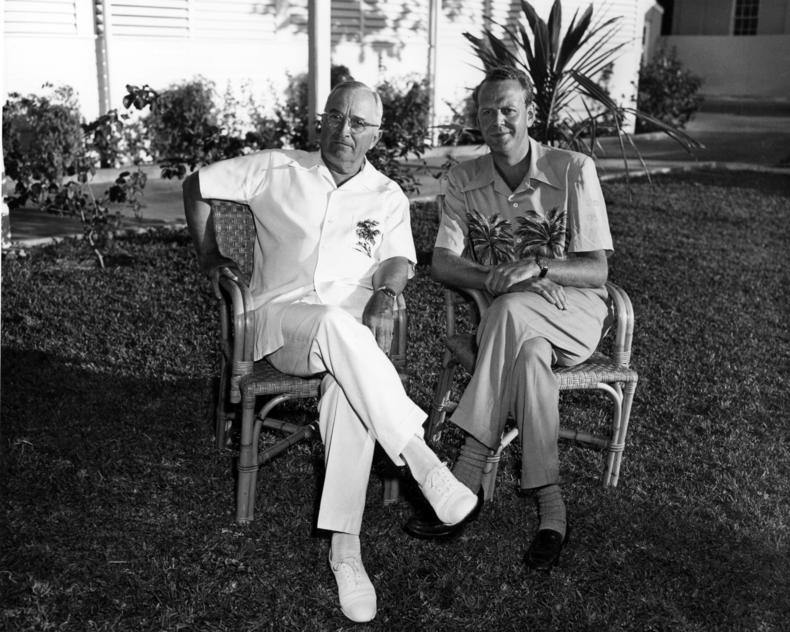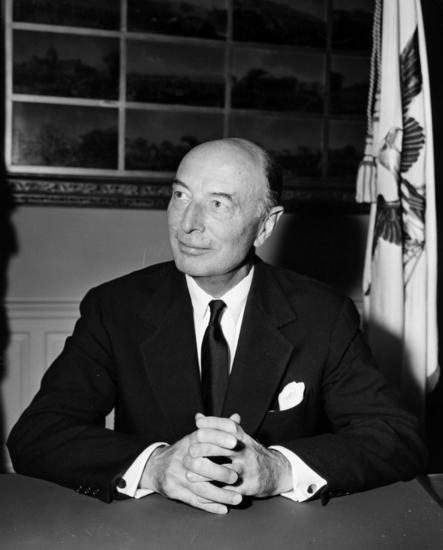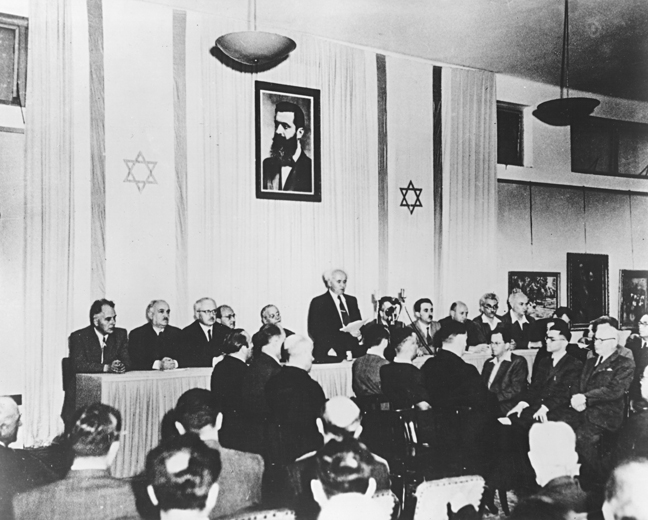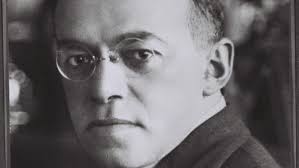William M. Mathew
See also Part I and Part II
A. GEORGE MARSHALL: ‘A NEAR-RUN THING’.
Truman’s fundamental position was straightforward – at least retrospectively. As President, he was in charge. In ‘differences of opinion between the White House and the State Department on the business of Palestine’, he wrote in his memoirs, ‘there was never any question as to who made the decisions and whose policy would be followed.’ He had to ‘make it plain’ to the career officials in the government ‘that the President of the United States, and not the second or third echelon in the State Department, is responsible for making foreign policy, and, furthermore [presumably recollecting the recent irregularities at the U.N.], that no one in any department can sabotage the President’s policy’.
Mere ex-officio assertion was, however, insufficient, given the authority of State with its prestigious secretary, its experts-rich Near East section, and Truman’s own lack of full electoral legitimacy. Some calculated manoeuvring was judged necessary in the very final hours preceding the end of the Mandate if a policy of recognising the new nation was to be implemented without serious mishap. Opposing an intimidating George Marshall was not remotely simple, and it was only by the most devious tactics that Truman managed in the end to effectively confront the general – and even then, very messily. That he felt the whole exercise profoundly difficult at a personal level is evidenced by the total absence of reference to the confrontation in his memoirs. (Marshall was still alive when these were published.) The episode took place on the afternoon of 12 May 1948, and Truman well knew that his methods on the day hardly covered him with glory.
What he chose to do was approach Marshall indirectly through the agency of a relatively obscure 41-year-old White House counsel, Clark Clifford (later serving briefly as Lyndon Johnson’s secretary of defense), who, as Truman understood, disagreed with much of official Washington on the dangers of any imminent recognition of Israel. ‘From the beginning’, Clifford later wrote, ‘I had … supported the creation of the Jewish state, even though this put me in opposition to an entire generation of senior foreign policy makers whom I admired and numbered among my friends, because I considered such action a strategic and historical necessity’ – this despite his acknowledgment ‘that oil, historic antagonisms, and numerical imbalances might create many of the problems Israel’s opponents in Washington predicted’. (Clifford, op. cit. – from which all quotations in this section are taken, unless indicated otherwise.) The extraordinary events of that critical afternoon are described in his memoir’s first chapter: ‘Showdown in the Oval Office’. The meeting proved ‘the most confrontational and hostile’ that he had ever attended.

Two days earlier, on 10 May, the President told Clifford at their ‘customary private day-end chat in the Oval Office: “Clark, I am impressed with General Marshall’s argument that we should not recognize the new state so fast. He does not want to recognize it at all, at least not now. I’ve asked him and Lovett [Robert, under secretary of state] to come in next week to discuss this business. I think Marshall is going to continue to take a very strong position. When he does, I want you to make the case in favor of the new state….Consider it carefully, Clark, organize it logically. I want you to be as persuasive as you possibly can be”‘. Clifford, fully aware of the historic weight of the moment, recalled: ‘The President regarded the Secretary of State as “the greatest living American”. Yet the two men were on a collision course over Mideast policy, which, if not resolved, threatened to split and wreck the Administration.’ Marshall, moreover, was ‘a man of the strictest rectitude, with little noticeable sense of humor. Not even Presidents Roosevelt and Truman called him by his first name….I feared that the President’s respect for Marshall might prevail’.
The meeting on 12 May – ‘a cloudless, sweltering day’ – was attended, Truman and Clifford apart, by George Marshall, his deputy Robert Lovett, Robert McClintock and Fraser Wilkins of State’s Near East desk, and David Niles of the White House staff (and supporter of Zionism). Lovett was asked to speak first, and expressed his concern over the growing ‘assertiveness’ of the Jewish Agency in Palestine under its chairman David Ben – Gurion and the Zionist notion that ‘they can establish their sovereign state without any necessity for a truce with the Arabs of Palestine’. Marshall, ‘austere and grim’, followed, expressing his well known doubts about recognition, and forecasting that if the Jews took precipitate action they would end up ‘running to us for help’. Despite recent territorial advances of the Zionists in the bloody conflict with the Arabs, it would be ‘dangerous’ for America ‘to base long-range policy on temporary military success’ – also offering the odd comment that he had never heard of Ben-Gurion, He concluded his presentation by advising that the U.S. ‘should continue supporting U.N. trusteeship resolutions and defer any decision on recognition’.

Truman then asked Clifford to speak. The counsel made it clear right away that he thought Marshall’s promotion of trusteeship ‘unrealistic’, and that Jewish military advances could not be regarded as temporary, as the secretary had suggested. ‘There has been no truce in Palestine and there certainly will not be one….Partition into Jewish and Arab sectors has already happened. Jews and Arabs are already fighting each other from territory each side presently controls’ – thus making the absolutely critical point that events had already run ahead of any resolutions that could be devised in New York and Washington. His advice, in total contradiction to Marshall’s, was that the President should ‘give prompt recognition to the Jewish state immediately after the termination of the British Mandate on May 14’ – and make an announcement to that effect using a text that he had just prepared.
The boldness was remarkable, most notably perhaps when he rounded off his presentation with a statement of principle that was almost presidential in its tone. ‘Jewish people the world over have been waiting for thirty years for the promise of a homeland to be fulfilled. There is no reason to wait one day longer. Trusteeship will postpone that promise indefinitely’. The United States had ‘a great moral obligation to oppose discrimination such as that inflicted on the Jewish people’. It was, moreover, a matter of American self-interest: ‘it is important for the long-range security of our country , and indeed the world, that a nation committed to the democratic system be established there [the Middle East], one on which we can rely’.
The secretary of state, encountering such blatant lèse-majesté, and no doubt sensing its presidential source, was furious: ‘I had noticed Marshall’s face reddening with suppressed anger when I talked. When I finished he exploded: “Mr. President, I thought this meeting was called to consider an important and complicated problem in foreign policy. I don’t even know why Clifford is here. He is a domestic adviser, and this is a foreign policy matter”‘. Truman replied: ‘“Well, General, he is here because I asked him to be here”’. At this point Robert Lovett interjected to suggest not only that it would be a serious error to offer recognition while the matter was still being deliberated at the U.N., but also that such a provocative move ‘”would be injurious to the prestige of the President”’. Marshall then, speaking with barely contained rage…made the most remarkable threat I ever heard anyone make directly to a President: “If you follow Clifford’s advice and if I were to vote in the election, I would vote against you” (Clifford’s emphasis). Everyone in the room was stunned’.
Truman, desperate now to end ‘this dreadful meeting’, turned to Marshall to offer some guileful reassurance: ‘”I understand your position, General, and I’m inclined to side with you in this matter”.’ It was Clifford, not the President, who had to bear the brunt of Marshall’s wrath: ‘not only did he never speak to me again, but, according to his official biographer (Forrest Pogue [1987]), he never again mentioned my name’. Clifford assumed that he had lost the argument in such fraught circumstances. Truman remarked to him as he left the Oval Office, ‘”Well, that was as rough as a cob. That was about as tough as it gets. But you did your best”‘. When Clifford suggested that it might be worth having another go at Marshall, Truman replied: ‘”You may be right, I don’t know. But I never saw the General so furious. Suppose we let the dust settle a little and see if we can this thing turned around….But be careful. I can’t afford to lose General Marshall”’.
Leaving the Office, Clifford ‘understood that the chances for salvaging the situation were very small – but not quite zero….I was thinking of how difficult it would be to conduct our foreign policy if we lost Marshall, or even if his opposition and threat to President Truman on this issue were to become known publicly’. Marshall, shaken, but still confident in his rectitude, composed a formal note that same evening for lodging in the State Department’s records: ‘I remarked to the President that, speaking objectively, I could not help but think that suggestions made by Mr. Clifford were wrong….The transparent dodge to win a few votes would not in fact achieve this purpose. The great dignity of the office of President would be seriously diminished’. If Clifford’s advice were to be followed, ‘and if in the elections I were to vote, I would vote against the President’. The charge of electoral motivation was one that Clifford, in his memoir, dismissed as ‘grossly unfair’.
Nothing was resolved on the following day, 13 May; and as late as the morning of the 14th,’the American government had still not decided what it would do when 6 p.m. came’ – midnight in Palestine. Marshall was standing firm, and Truman was immobilised by the fear that the breach with the general would become common knowledge. Meanwhile, at the United Nations in New York, the American delegation was still advancing Marshall’s policy of trusteeship for Palestine. Crucial last-gasp exchanges were taking place between Clifford, acting on the President’s authority, and Robert Lovett, Marshall’s friend as well as deputy, to see if there was any way of stopping the secretary of state going public on his rift with Truman. ‘We were’, Clifford writes, ‘in the midst of the most difficult months of the Cold War and we had to avert a split in our ranks – any leak of the astonishing events of that afternoon would be catastrophic’. There was, he told Lovett on the evening of the Oval Office meeting, ‘no chance whatsoever that the President will change his mind on the basic issue….He wants to recognize the new state. So all I can say is that if anyone is going to give, it is going to have to be General Marshall’.
Truman, still acting behind the scenes, told Clifford the next morning, 13 May: ‘Keep encouraging Lovett to work on the General’ – which the counsel did, reporting again to Lovett: ‘I’ve talked to the President, and I want to tell you that he is not going to budge an inch in his basic view. He is rock solid’. Marshall, learning of this, must have wondered what had changed since the afternoon before, when Truman had told him, ‘I’m inclined to side with you in this matter.’ He might also have felt some concern that the dispute was being handled by proxies. His private reaction is not recorded, but he clearly was forced to the conclusion that his opposition was now pointless, and could not be respectably sustained short of his resigning. At 4pm on the 14th a mere two hours before the end of the Mandate, Lovett telephoned Clifford: ‘Clark, I think we have something we can work with. I have talked to the General. He cannot support the President’s position, but he has agreed he will not oppose it’. Clifford expressed instant relief: ‘God, that’s good news’. Marshall himself refused to ring Truman with his assurance, Clifford surmising: ‘it was too painful for him to do so’. Lovett himself took charge of informing the President.
Only thirty minutes remained before the end of British rule and the declaration of Israel’s independence. ‘It had’, writes Clifford, ‘been a near-run thing, but the deed had been done’. And it was now time, embarrassingly, to inform the American delegation at the United Nations – still that very day earnestly debating on the virtues of trusteeship – that Palestine policy had been suddenly upended. The New York Times reported the following day that ‘the first reaction was that someone was making a terrible joke, and some diplomats broke into skeptical laughs’. And, as Clifford relates, Lovett, despite his successful efforts to get his chief to withhold his scorn, ‘remained adamant for the rest of his life…that the President and I had been wrong – as did most of his colleagues’. Marshall himself was much too grand, too informed, and too committed to existing Palestine policy to be swayed by the radical alteration in presidential perspectives but, in the end, he knew himself to be a mere appointee. One of his biographers, Ed Cray (General of the Army: George C. Marshall, Soldier and Statesman [2000]) quotes him as remarking to some would-be critics: ‘No, gentlemen, you don’t take a post of this sort and then resign when the man who has the constitutional responsibility to make decisions makes one you don’t like’. Cray, however, suggests that the matter was hardly settled by the general’s professional restraint. ‘Miffed State Department staff members leaked stories of a rift between the president and his secretary….On August 10, the president felt compelled to deny publically that Marshall had threatened to resign’.
The fact that Truman had acted in defiance of the Department of State and its secretary, and that tensions persisted between the White House and Foggy Bottom, was not lost on the Zionists. Clearly official Washington had not been comprehensively won over to the Zionist cause. Nor, it seems indeed, had Truman himself. His hand had been forced by the rapidly changing military and political facts on the ground in Palestine (as documented in Part II) and by fears that other international players, in particular the Soviets, might take advantage of a sudden post-Mandate power vacuum there. These were the paramount considerations, and not any intellectual conversion to the cause of Zionism, or some presidential resolution of his previous, troubled circumspection.

Dennis Ross points out in his important book (op. cit) that although Israel was given ‘immediate credibility and international standing’ by the de facto recognition, ‘American support … for the remainder of Truman’s term remained more symbolic than material’. De jure recognition did follow in January 1949, after the first Israeli elections, but the President continued to face ‘constraints, and the actual support he provided was limited’, his approach to Palestine being ‘necessarily influenced by the far broader context of the enormous national security challenges he faced’. The arms embargo imposed on all exports to the Middle East in December 1947 remained in place, this effectively penalizing ‘only the Jews, as the British continued to provide weapons to Arab armies and these leaked to Arab forces in Palestine’. It was not lifted when Egypt, Syria, and Jordan invaded Israel in May 1948; and after the Jews seized part of Sinai in the course of the resultant conflict, Truman insisted that if the territory was not at once returned to Egypt the United States would ‘undertake a substantial review of its attitude towards Israel’ and reconsider its support for the country’s membership of the United Nations. And he was ‘rather disgusted’ over Israel’s reluctance to accept Arab refugees after the 1948 war,
In brief, much of Truman’s old negativity on Zionism, as previously documented, carried over into the post-recognition period, thereby failing to ease Jewish anxieties over the duration and strength of American commitment to their new state.
B. CONSEQUENCES FOR ZIONISM
Zionists in Palestine, afraid that their great-power sponsors, the United Kingdom after 1917 and the United States after 1948, might not last the course, adopted, as suggested at the outset, an aggressively self-regarding and militaristic pursuit of their goals. Of Zionist leaders, Chaim Weizmann has attracted much more historiographical attention over the decades than has his political nemesis Ze’ev Jabotinsky – unsurprising considering his decades of propagandising presence in western capitals, his close dealings with presidents and prime ministers, his achievement in becoming Israel’s own president in 1948, and the fact that, like Winston Churchill around the same time, he became his own historian of events. Jabotinsky, nevertheless, is the more instructive figure of the two, perceptive as to the impossibility of sustained great-power support for the Zionist cause, and aware, through his metaphor of the ‘Iron Wall’, of the fundamental impossibility of political compromise between Arabs and Jews in Palestine, short of the former’s terminal capitulation: something that Weizmann, as a persistent, tendentious ambassador to the gentile world, could never fully accept, deriding Jabotinsky as a man of ‘explosive repressions’, invariably ‘pulling the movement towards the abyss’. (Weizmann, op. cit.) As the ideological father of Likud (though greatly surpassing that present-day body both morally and intellectually), his heritage is more compelling than Weizmann’s, despite his early death in 1940 and his weak emotional attachment to Palestine, (A 1929 British ban on his visiting there lasted for the rest of his life.)

Avi Shlaim (op. cit.) emphasises Jabotinsky’s influence well beyond the confines of revisionist Zionism, and on David Ben-Gurion and the Israeli Labor Party in particular, quoting Ben-Gurion’s June 1936 letter to the Jewish Agency Executive: ‘A comprehensive agreement is undoubtedly out of the question now. For only after total despair on the part of the Arabs…may the Arabs possibly acquiesce in a Jewish Eretz Israel’. He did not, observes Shlaim, ‘use the terminology of the iron wall, but his analysis and conclusions were virtually identical to Jabotinsky’s’. The chapter of his Recollections (1970) entitled ‘Independence’ is entirely taken up with military matters. ‘We had no illusions’, he writes, ‘about being allowed to live in peace with the advent of independence….As head of the Jewish Agency…I had for years (ever since the Biltmore Conference [New York] in 1941) been preoccupied with purchasing military equipment from abroad.’ At the start of the hostilities preceding independence ‘we had 45,000 able-bodied women and men connected with Haganah and Palmach’. A later Labor prime minister, Yitzak Rabin – who had commanded a Palmach brigade in the fighting preceding the end of the Mandate (The Rabin Memoirs [1979]) – held to the same iron-wall idea, but considered that the ‘despair’ foreseen by Ben-Gurion had possibly materialised by the 1970s and that it might accordingly be appropriate to attempt productive negotiations with the Arabs. No such exchanges of course succeeded.
As early as 1925 Jabotinsky had grasped the elemental truth that was to underlie the failure of all attempts by the United Kingdom, the United States, and the United Nations to arrange peace for Palestine – a bleak record that was well perceived by realist Zionists, thereby determining the general thrust of their political and military behaviour. ‘Any native people’, Jabotinsky wrote, ‘ views their country as their national home of which they are complete masters. They will not voluntarily allow, not even a new master, but even a new partner. And so it is for the Arabs….They look upon Palestine with the same instinctive love and true fervour that any Aztec looked upon Mexico or a Sioux looked upon the prairie’. Four years later, speaking at a rally in Tel Aviv, he declared: ‘Everyone talks about peace in this country. There is no peace and there never will be’. (Hillel Halkin, Jabotinsky. A Life [2014])
As has been suggested here, it was militarised inter-ethnic conflict, intrinsic to the contrived polity, that drove the circumstances leading to Harry Truman’s recognition of the new state on 14 May 1948. The violence, both state and popular, that was irredeemably built into the Zionist project has remained the critical determinant of events in Palestine ever since.
